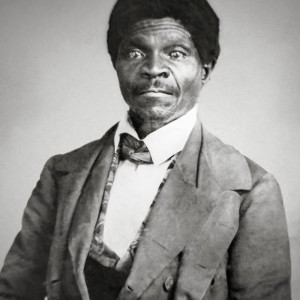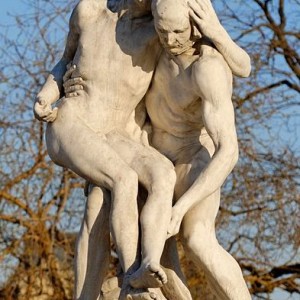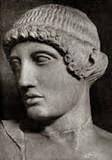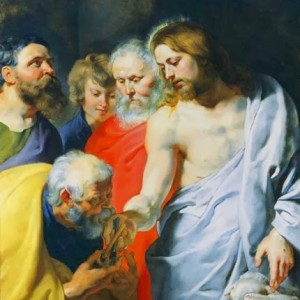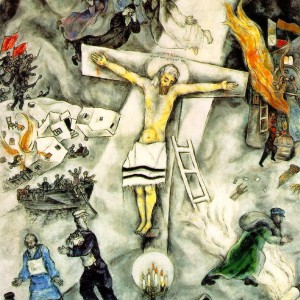Envision in your mind an enormous tree containing many limbs, which branch off into smaller branches, which branch off into twigs, which sprout leaves. The branches and foliage are so thick that you can’t see the trunk of the tree at all. Alexandre Calame, Landscape with Oak (1859) Although you can’t see the trunk, you… Continue reading Of Thick Trees and Morality: An Analogy.
Author: Joe Heschmeyer
Can Objective Morality Exist Without God? (Round 2)
My debate with Steven Dillon on whether objective morality can exist without God continues on Strange Notions. On Wednesday, they posted my rebuttal to Steven’s opening statement, and today, they posted Steven’s rebuttal to my opening statement. From my rebuttal: Is Agony Intrinsically Evil? In my opening statement, I suggested that non-theistic moral systems cannot… Continue reading Can Objective Morality Exist Without God? (Round 2)
Can Objective Morality Exist Without God? (Round 1)
Can objective morality exist without God? That’s the question that Steven Dillon and I are debating over at Strange Notions. The schedule is as follows: Monday (11/4) – Joe’s opening statement (affirmative) Tuesday (11/5) – Steven’s opening statement (negative) Wednesday (11/6) – Joe’s rebuttal (affirmative) Thursday (11/7) – Steven’s rebuttal (negative) Friday (11/8) – Questions… Continue reading Can Objective Morality Exist Without God? (Round 1)
The HHS Mandate is “Self-Defeating”? A Federal Court of Appeals Weighs In.
The Court of Appeals for the District of Columbia Circuit issued an important ruling about the HHS Mandate today. The ruling makes several important points, and frames the HHS Mandate debate in a productive way. It’s certainly an exciting moment for those of us against the mandate, even though it doesn’t go nearly as far… Continue reading The HHS Mandate is “Self-Defeating”? A Federal Court of Appeals Weighs In.
Two More “Reformation Day” Ironies
In addition to being Halloween, October 31st is “Reformation Day,” celebrating Martin Luther’s defiant act of nailing his 95 theses to the door of the Castle Church in Wittenberg, Germany, on this day in 1517 (more on this soon). For the last two years, I’ve used the day to point out the unintentional ironies of Reformation… Continue reading Two More “Reformation Day” Ironies
The Council of Florence on the Pope, the Church and the Bible
The Council of Florence is one of the most exciting, and in some ways, one of the most tragic, Councils in the history of the Church. It’s one of the so-called “reunion Councils,” which seemed poised to heal the Great Schism between the Roman Catholic and Eastern Orthodox Church. The first reunion Council was the… Continue reading The Council of Florence on the Pope, the Church and the Bible
Establishing Absolute, Knowable Truth, in Three Easy Steps
Gorgias Gorgias the Nihilist, an ancient Greek philosopher, was said to have argued the following four points: Nothing exists; Even if something exists, nothing can be known about it; and Even if something can be known about it, knowledge about it can’t be communicated to others. Even if it can be communicated, it cannot be… Continue reading Establishing Absolute, Knowable Truth, in Three Easy Steps
Why Argue Against Non-Catholic Beliefs? Why Not Just Argue for Catholicism?
Why do I argue against Protestantism, Mormonism, Atheism, etc.? This question came up recently, in response to my last post. Instead of laying out the case for the Catholic interpretation of Matthew 16:18, it was an explanation of why the Protestant interpretation was wrong. On Facebook, a reader responded, “You should rename your blog from… Continue reading Why Argue Against Non-Catholic Beliefs? Why Not Just Argue for Catholicism?
Is “The Rock” of Matthew 16:18 St. Peter? Or His Confession of Faith?
One of the most hotly-contested passages in Catholic-Protestant dialogues is the “Upon This Rock” passage in Matthew 16:18. After the Apostle Simon confesses faith in Jesus as the Messiah (the Christ), Jesus says to him “And I tell you, you are Peter, [Petros] and on this rock [petra] I will build my church, and the… Continue reading Is “The Rock” of Matthew 16:18 St. Peter? Or His Confession of Faith?
Pope Francis and the White Crucifixion
When asked about his favorite painters, Pope Francis responded: “Among the great painters, I admire Caravaggio; his paintings speak to me. But also Chagall, with his ‘White Crucifixion.’” It’s a fascinating choice. Marc Chagall was, as Wikipedia notes, “the quintessential Jewish artist of the twentieth century.” He was also captured by the figure of Jesus Christ: he has numerous… Continue reading Pope Francis and the White Crucifixion

